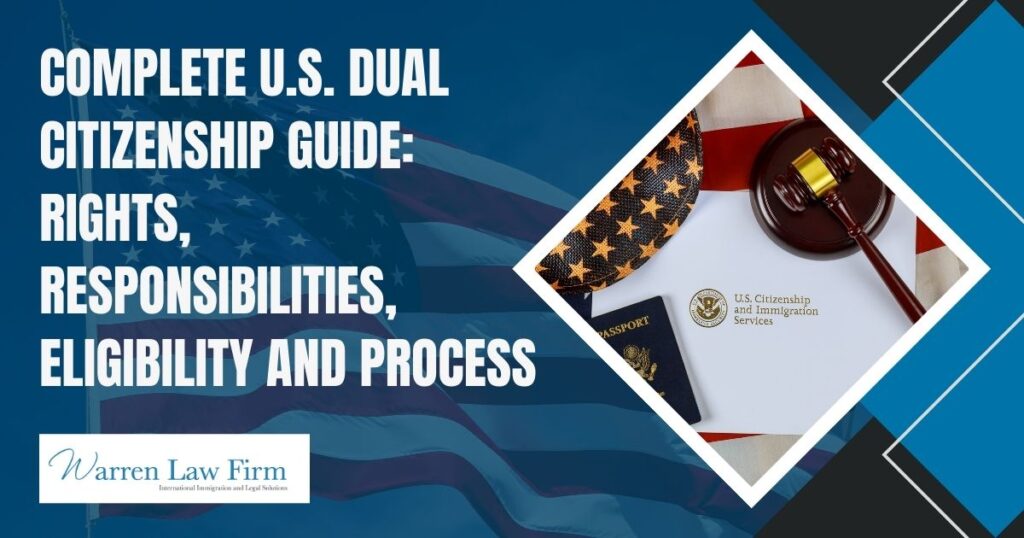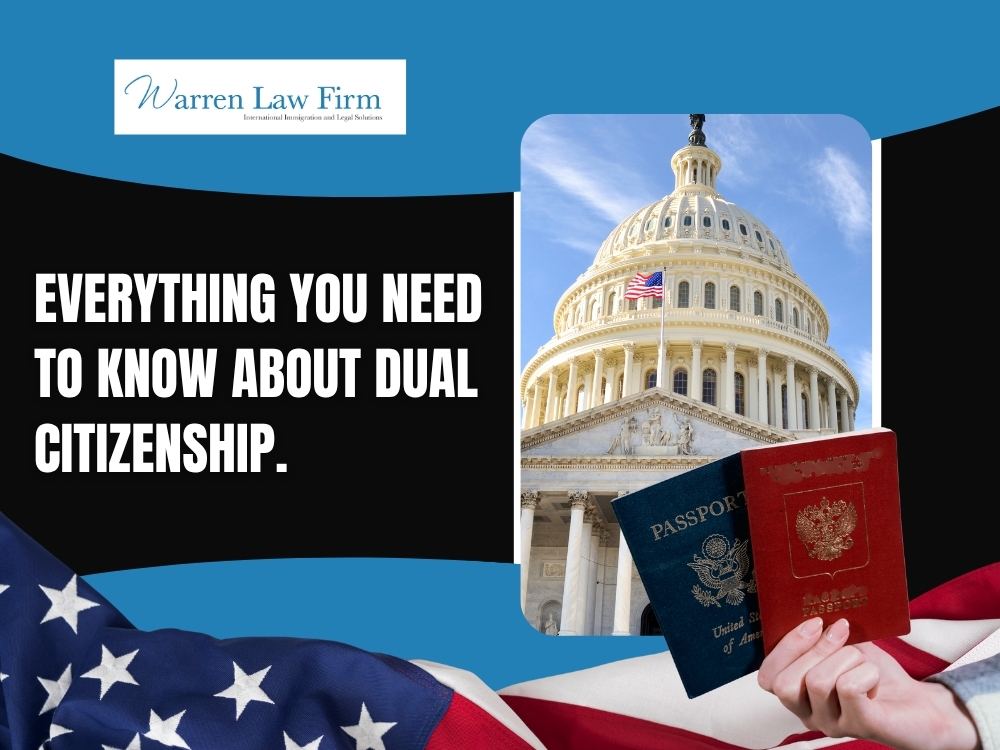The Complete Guide to Dual Citizenship
Home » Family Immigration Attorney » The Complete Guide to Dual Citizenship

Dual citizenship may offer a lot of benefits, such as easier travel and more opportunities to work and live abroad. But it’s not always easy to get dual citizenship, and there are some things you should know before you apply. Working with a dual citizenship lawyer gives you the best chance of a seamless application.
This guide explains everything you need to know about dual citizenship, from the basics of how it works to the specific requirements for each country.
Table of Contents
Request A Consultation
Meet The Attorney
Angela D. Warren
With more than 20 years of immigration and business immigration experience, Angela Warren has helped hundreds of individuals, families and businesses.
Get The Immigration Help You Deserve
Your Guide to Dual Citizenship
If you’re exploring dual citizenship, you probably have a lot of questions – most people do. Some of the most pressing may be:
- Does the U.S. have a law about holding dual citizenship?
- Do all countries allow you to have dual citizenship?
- What happens when you swear allegiance to the United States?
- What rights and responsibilities do you have as a U.S. citizen, and will they conflict with your rights and responsibilities as a citizen of another country?
- How do you get dual citizenship?
The following sections provide the answers you need.

Is Dual Citizenship Legal in the United States?
The U.S. has no formal laws prohibiting dual citizenship. You can become a citizen of the United States and maintain your citizenship in another country at the same time.
There are, however, some things to keep in mind if you’re a dual citizen of the United States:
- You’re required to comply with all U.S. laws, even if they conflict with the laws of your other country.
- You’re required to pay taxes in the U.S. even if you are no longer residing in the U.S.
- You may have difficulty renewing your passport from your other country.
It’s legal to hold citizenship in the U.S. and another country – at least according to U.S. laws.
However, other countries have other rules; it may be illegal for you to hold dual nationality in your other country.
What Countries Allow Dual Citizenship?
Not all countries permit their citizens to hold dual citizenship, though most do. The countries that don’t allow dual citizenship for adults as of this writing include:
- Bahamas
- China
- Haiti
- Indonesia (except in certain circumstances)
- Japan
- Kuwait
- Laos
- Malawi
- Myanmar
- Nepal
- The Netherlands (except in certain circumstances)
- Panama
- Saudi Arabia
- Singapore
- Thailand
- Vietnam
It’s important to note that Indonesia allows children under the age of 18 to hold dual citizenship; in The Netherlands, only those who marry a citizen are permitted to hold dual nationality.
What About the Oath of Allegiance to the United States?
When you become a citizen of the United States, you’re required to take an Oath of Allegiance. The oath requires you to affirm your loyalty to the United States, which may be at odds with your responsibilities to another country. The U.S. requires you to put the U.S. first, even when you’re a citizen of another country.
Get The Immigration Help You Deserve
Rights and Responsibilities of U.S. Citizens
As a U.S. citizen, you have certain rights and responsibilities. These include:
- The right to vote in federal elections
- The right to live permanently in the United States
- The responsibility to file taxes in the United States
- The responsibility to obey U.S. laws
- The responsibility to serve on a jury if called upon
- The responsibility to register with the Selective Service if you’re a male between the ages of 18 and 26
If you’re a dual citizen of the United States, you’re also required to comply with all U.S. laws, even if they conflict with the laws of your other country.

How to Get Dual Citizenship
You can’t simply apply to become a U.S. citizen, get a stamp and a naturalization certificate, and be on your way. The process is actually much more intense than that.
Typically, to become a U.S. citizen, you must:
- Be at least 18 years old
- Have a green card for at least five years (or three years if you’re married to a U.S. citizen)
- Live in the state where you’ll be applying for citizenship for at least three months before the date of your application
- Demonstrate continuous residency in the United States for at least five years (or three years if you’re married to a U.S. citizen)
- Be able to read, write and speak basic English
- Have a basic understanding of U.S. history and government
- Demonstrate good moral character
To become a U.S. citizen, you must go through a process called naturalization. The first step is to file form N-400, which is the application for naturalization. After you submit your application, you’ll be called in for an interview with a USCIS officer who will ask you questions about your application, your background and your understanding of U.S. history and government.
After you pass the interview, you’ll be scheduled for a citizenship test, which covers U.S. history and government. You must answer at least six out of 10 questions correctly to pass. When you pass the test, you’ll be scheduled for a ceremony during which you’ll take the Oath of Allegiance to the United States. After taking the oath, you’ll be officially sworn in as a U.S. citizen.
The entire process can take up to a year, but it may take longer if there’s a backlog of applications. (And that timeframe doesn’t count the waiting period before your application.)
Determining Whether You’re Already a Dual Citizen
If you were born in the United States, or if you were born to an American parent abroad, you’re automatically a U.S. citizen. But you might also be a citizen of the country where your parents were born. For example, if your parents were Mexican citizens who were living in the U.S. when you were born, you would be a dual citizen of the United States and Mexico.
There are a few ways to determine if you’re already a dual citizen:
- Check your parents’ citizenship status. If they were citizens of another country when you were born, it’s likely that you’re a dual citizen.
- Check your birth certificate. In some cases, your birth certificate may list your parents’ citizenship status.
- Contact the embassy or consulate of the other country. You can contact the embassy or consulate of the other country to inquire about your citizenship status.
Pros and Cons of Dual Citizenship
There are both advantages and disadvantages to being a dual citizen. Potential advantages include:
- You can live and work freely in two countries.
- You can own property in both countries.
- You have access to the social services and benefits of both countries.
- You can vote in both countries.
- You can travel freely between the two countries.
- Families can access healthcare and education benefits in both countries.
- Children can benefit from exposure to multiple cultures and educational systems.
- Dual citizenship can provide access to business opportunities, trade benefits, and professional licensing in both countries.
Potential disadvantages may include:
- You’re subject to the laws of both countries, even when they conflict with each other.
- You may have to pay taxes in both countries.
- You may be drafted into the military service of both countries.
- Managing passports, documentation, and compliance in two countries can be complex and time-consuming.
- Conflicting obligations, such as military service or legal duties, may arise between the two countries.
What You Need to Know About Consular Protection
As a U.S. citizen, you have the right to consular protection while traveling abroad. That means that if you’re in another country and you need assistance, you can contact the nearest U.S. embassy or consulate for help – but the U.S. may not be able to help you if you’re in a country in which you hold citizenship.
Which Passport Do You Use When You Have Two From Different Countries?
If you’re a dual citizen of the United States and another country, you may travel to most locations on either passport; you can choose which to use based on your own personal reasons. However, sometimes when you’re traveling into or leaving a country in which you have citizenship, you’re required to use your passport for that country. (The U.S. doesn’t require you to use your U.S. passport either way, but some countries do.)
Get The Immigration Help You Deserve
Frequently Asked Questions to a Dual Citizenship Lawyer
Can dual citizens vote in both countries?
As a dual citizen, you may have the ability to vote in more than one country, but this depends on the laws of each nation. In the United States, you can vote in federal elections—even if you live abroad—by registering for absentee ballots. The Federal Voting Assistance Program (FVAP) can help you make sure your ballot is submitted correctly and on time.
In your other country of citizenship, the rules may be different. Some countries allow you to vote only if you reside there or meet certain registration requirements. Others may permit you to vote through an embassy or consulate abroad. A few countries restrict or prohibit voting rights for dual citizens entirely.
It is important that you understand the voting requirements in both countries. By keeping your registration up to date, following all deadlines, and complying with the rules, you can ensure your vote is counted and avoid potential legal issues. With proper planning, you can responsibly exercise your right to vote in both nations where you hold citizenship.
Do dual citizens have to pay taxes in both countries?
Tax obligations for dual citizens can vary widely depending on the tax laws of the countries involved and whether those countries have a tax treaty in place. In some cases, dual citizens may be required to report their income and pay taxes in both countries. However, many countries have agreements to prevent double taxation, allowing individuals to claim foreign tax credits or exemptions for taxes paid in one country against the taxes owed in another.
Once you are a U.S. citizen, you must continue to pay taxes every year, even if you are not actively living in the U.S.
Which passport should I use as a dual citizen?
U.S. law requires citizens to enter and leave the U.S. using their U.S. passport. For travel to other countries, dual citizens should generally use the passport of the country they are entering, as this may simplify entry, reduce visa requirements, and ensure compliance with local laws.
Having both passports valid and current is important, as it allows smooth international travel and helps avoid complications with immigration authorities in both countries.
How does dual citizenship affect visa applications?
Dual citizenship can provide practical advantages for international travel. For instance, if one of your passports offers visa-free entry or simpler visa requirements for a destination country, you can use that passport to streamline travel.
However, holding dual citizenship does not exempt you from U.S. or foreign visa rules. U.S. citizens traveling abroad must still follow U.S. regulations, such as reporting foreign travel when required, and comply with the visa and entry requirements of other countries. Understanding the rules for both passports is essential for planning travel efficiently.
Schedule a Consultation with a Dual Citizenship Lawyer
If you’d like to become a U.S. citizen (no matter where you are in the process), if you have questions about the process of obtaining dual citizenship or need help with any other aspect of U.S. immigration law, call our office right away. We can give you the guidance you need to reach your goals.
